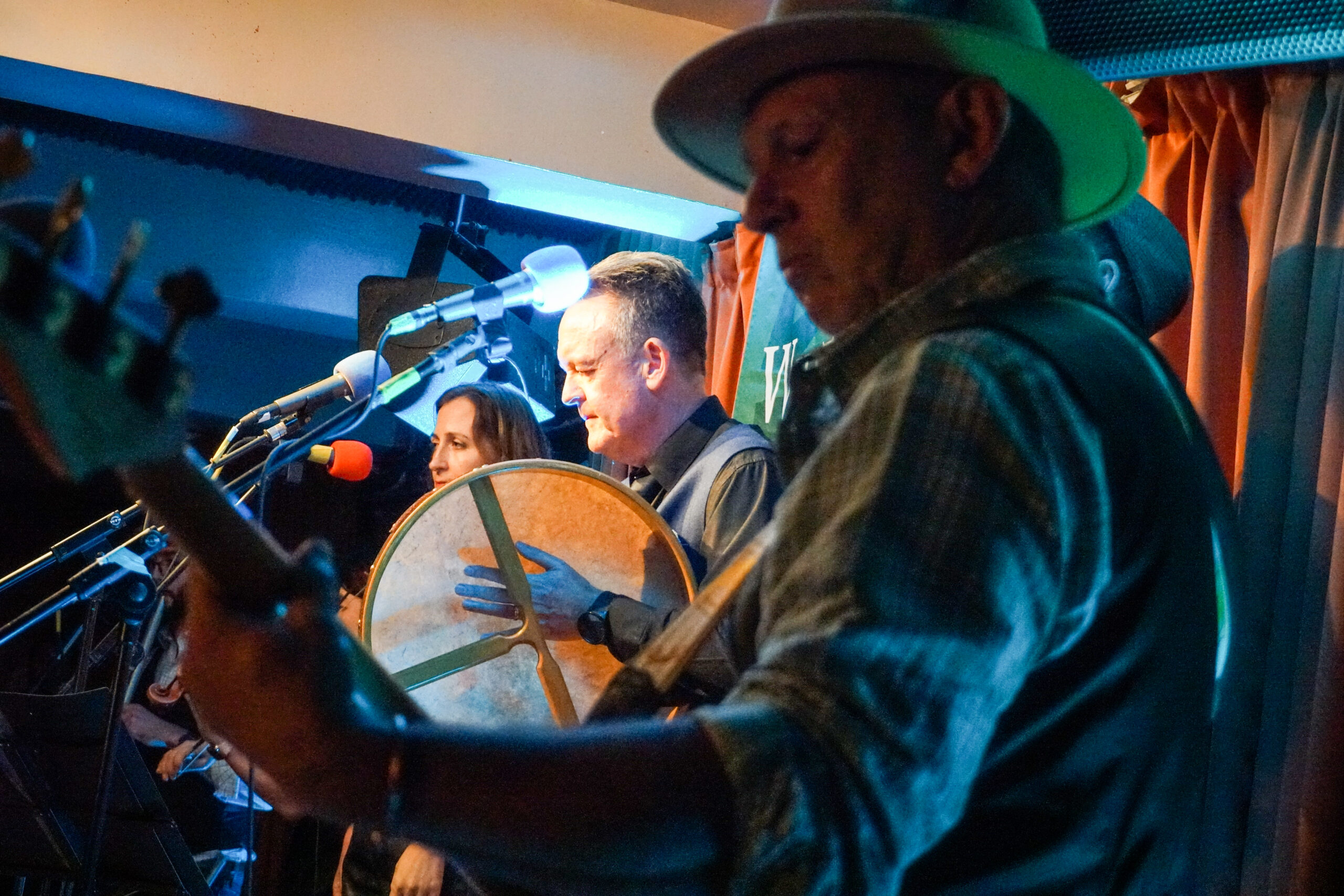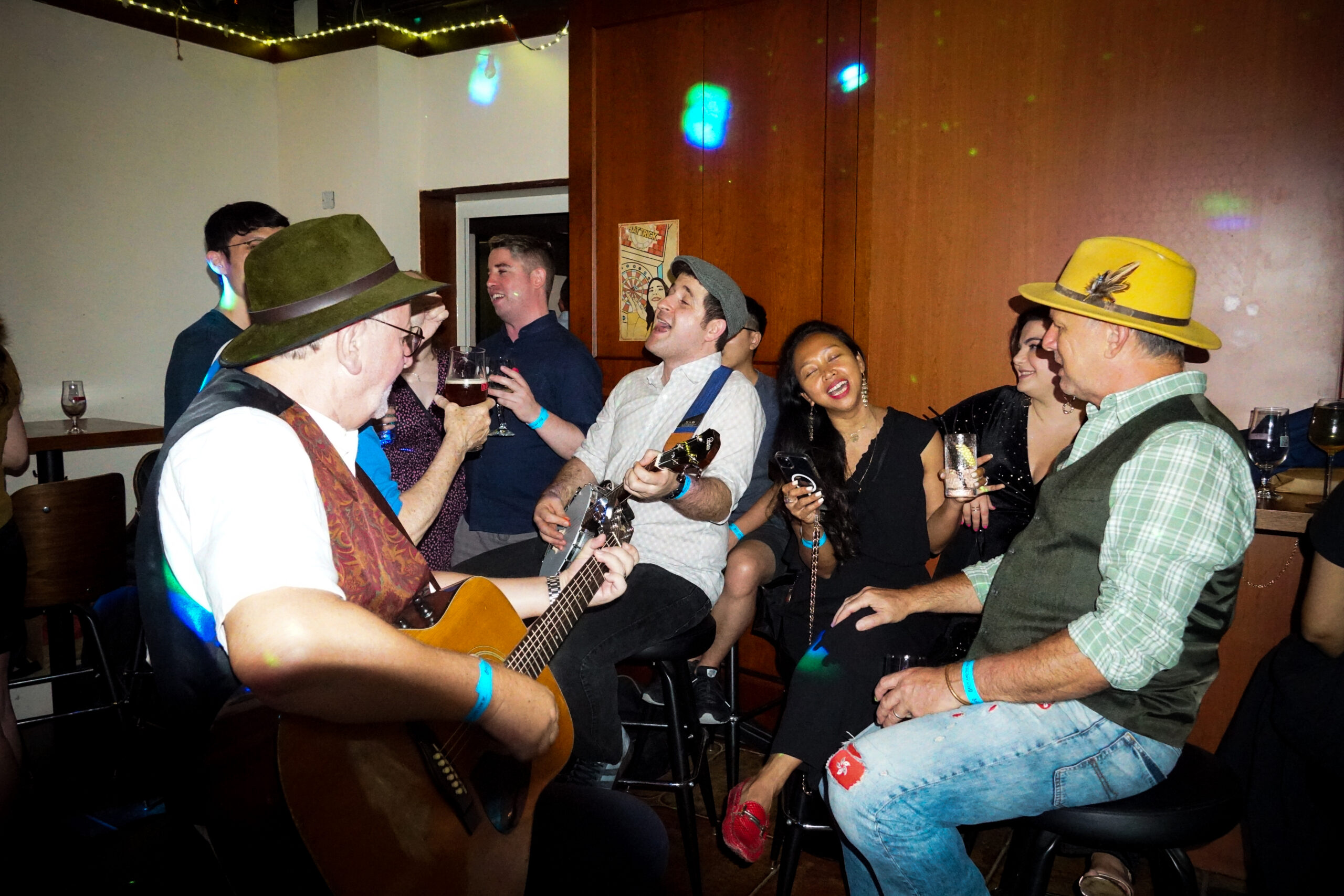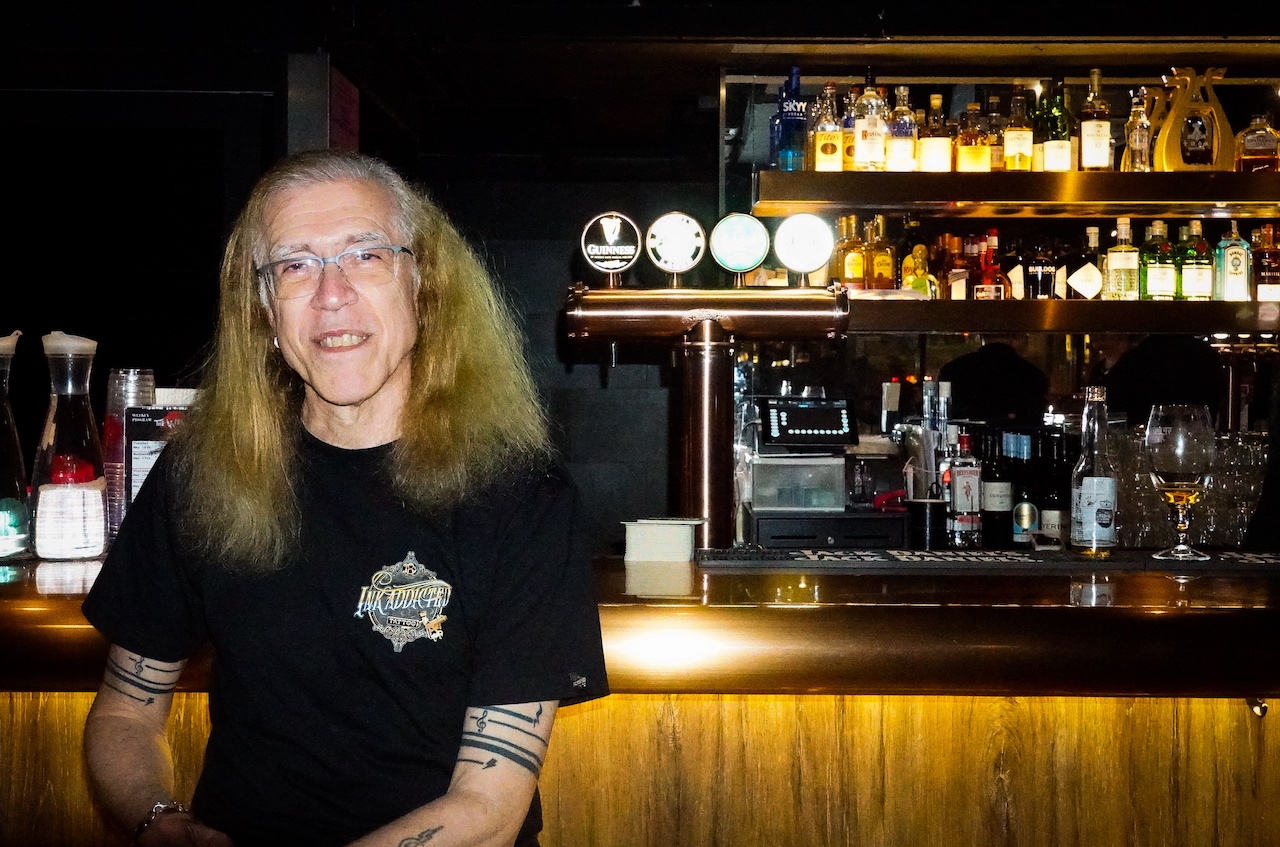Mark Rawson hugs everyone who walks into the What the Folk venue. It feels more like a gathering of friends and family than a bar filled with strangers; the cozy atmosphere is made intimate by friends and couples tapping their feet to the music. They came to experience the sound in this space, and at this moment, it is the most important thing.
Hong Kong’s music scene plays a unique role at the intersection of the city’s ‘east meets west’ culture. Chinese musicians compare it to the scene in Beijing, while local musicians talk about it in the same breath as Tokyo and Taipei, sometimes even London and New York. The city’s inclusivity and unique blend of cultures and voices attracts music lovers from all over.
What do we think about when we talk about folk?
When I noticed the event What the Folk in Hong Kong, it reminded me of a group of dedicated musicians in Beijing who has been trying to bring different vibes to the city by organising regular music events called What the Folk since 2021.
“We call ourselves (Hong Kong) the world city. And we have multi-diverse population bases here,” said Rawson. “Where do the large African communities perform? Where does the Nepalese community perform? Where does the Indian community perform? Where does the Filipino community perform, if they’re not performing Western covers?” Rawson saw an opportunity to create What the Folk, a platform to bring together these different communities and showcase their music.
When Rawson was a teenager, folk was not his main genre of interest. Punk had its glorious time in the 70s and 80s, capturing the hearts of young people like him, who moved away from what their parents told them in order to achieve their aspirations .
But, as he got older, Rawson has developed a deep appreciation for the content and identity found in folk music. For him, folk music is a constantly evolving form that tells stories about the culture, history, and environment of a particular group of people.
“I come from the UK, and sort of Britain. And basically, when you grow up there, particularly if you’ve got any Irish heritage, which I do through my mother, then you always have songs and stories of the old country, sort of told to you when you’re young. And that’s what happened to me,” Rawson said.
Rawson retired from the finance industry several years ago and describes himself as semi-retired and puts his heart and soul into music. In Hong Kong, he is a familiar face in the music scene. Most of that time, he played in party bands, cover bands and bands of that nature.
Rawson said that he loves all kinds of music. But so far, he has gravitated to folk. During the Covid pandemic, Mark started What the Folk to provide a platform for people to perform during difficult times and to showcase individuals that represent their communities.

Mark Rawson playing with his band Black Velvet Collective.
Dan Taylor, a British musician from a chamber folk group and one of the organisers of What the Folk in Beijing, reflects that every country has its own folk music. However, the approach to melodies is similar, and the beauty of folk music is that its melodies sound timeless, as if you’ve heard them before.
When I asked Mark how he attracts the audience to his shows, he explained that it is all about passion, not business.
While both events share the same name, the idea of What the Folk in Hong Kong had been brewing in owner Mark Rawson’s mind for quite some time.
Both events are not yet known by great audiences, but they surely have touched some souls.

All laughs at the What the Folk after party.
Exclusive Access
Visage One hides within a dimly-lit gap in an old Hong Kong tong lou, a type of old building that can be found all over Hong Kong. Though it is hidden, people find their way in. Outside, crowds gather around the shimmering lights spilling out from shop-fronts onto the pavement. A long queue has formed at the corner of a narrow alley, up from the wide stairs of Hollywood Road, just above the famous cocktail bar COA. Every so often, a few people at the front are let in, while the rest must stick around and try their luck later.
The venue has maintained two lives for 19 years. In the daytime, Visage One is a quiet barber shop that blends in with its surroundings. On Saturday evening, the scene becomes wild.
“For myself, it’s an honest living,” said Ben Chan, a local Hong Konger and the owner of Visage One. “I’m not young, I already know the world is ugly. But I’m still alive. I try to do a little thing like how to cut people’s hair, how to do music, how to live more honestly.”
Fellow barbers that started the business with Chan have gone on to open bigger shops and make more money. But Chan is content with his small place where he holds onto his ideals.
“When I opened the shop, my idea was to have hair and music, but only one person,” said Chan. “I just want to do something like a studio…… This is my living…… I don’t want to make big money and then I have to worry about how to take care of my money.”
Chan doesn’t sell drinks. Visitors bring their drinks there. Sometimes Chan provided free wines to the visitors that forgot to bring any. The entry fee is 150 HKD per person, regardless of which musicians are playing that night. Sometimes it’s an unheard of amateur jazz band, on other occasions an award-winning musician. Chan doesn’t ask them what’s on the playlist, rather they have full freedom in choosing the music – covers, original songs or an improvised jam.
In Chez Trente, owner Joe Lung carefully selects both audience and musicians. If you’re not in the know, good luck finding the bar’s entrance, painted all black, etched in a black wall, hiding in a narrow alley in Sheung Wan. But if you’re a jazz lover, or a musician who loves to jam, you’re sure to find your way in.
“If you kick your own thing, you make a very clear image to people,” Lung said. “And then you make yourself sustainable. We keep doing it for a long time and eventually you gather the people with the same value.”
Both Chez Trente and Visage One were fortunate to survive the pandemic, when other music venues of this kind closed down. Lung says he believes Chez Trente inherited the spirit of those venues that closed, such as Sense 99. He points at a mini red couplet with the idiom “Jiu Jiu Chang Qing,” (“the emotions and connection last for long”), a pun of “99”, and says, “I think everything kind of stems from here.”
“If I open a bar and really make money and all that stuff, that’s cool, too. But I wouldn’t go there every night,” he continues. “You need to be there long enough so you’re nurturing long-term relations and friendships. That’s very lovely.”
A Music Community
At both venues, the roles of audience and musician often reverse, contributing to the sense of community. People cram into each space-like canned sardines. A wrong move might tip the crowd under a rain of spilt alcohol. People are packed into the doorway, some squeeze on the staircase towards the wooden platform, others crouch on the floor in front of the musicians and, yet, the audience stays engaged in the music. Some sway their heads with the beat and there are a few muffled conversations while the performance goes on.
Both bars attract people not only from Hong Kong, but mainland China, Australia, and New York, as well. A boy from Tianjin paid a visit to Visage One to seek advice ono building a similar place back home. A couple that run a music venue in Australia visited purely for its fame. According to Chan, the Grammy nominated best guitarist in 2016 also flew from New York to Visage One to perform.
At Chez Trente, every Wednesday is jam night. Every Tuesday, open mic. Beginners and experienced musicians alike play together free from judgement. In return for a few chords, you’ll get a song enriched with piano, guitar, drum, and bass, all the elements you need.
“I think the connection between the performers and the audience is closer,” said Lung. “It creates an atmosphere that is more friendly and inclusive.”
Music performances are on Fridays and Saturdays. Entry fee is 180 Hong Kong Dollars, regardless of performers. The venue has welcomed famous local Hong Kong musician Jing Wong, award-winning jazz musician Alan Kwan and many others.
“In Hong Kong, this is the only place to jam,” says local musician Jerold Chu, who hangs out frequently in Chez Trente. Like many local musicians, he returned to Hong Kong after starting the early stages of his music career in London.
In his opinion, musicians are less divided by level or genre in Hong Kong; you’re accepted by the music community regardless of your playing experience. Whereas in London, musicians tend to hang out in different venues depending on their experience and genre of music.
“I guess I like it for being able to make a community of people, who come and hang out, and appreciate music,” said Chu. “And for musicians it’s just a nice place to go after their gigs.”
Stand Here with a Will
The Wanch has been open for over 30 years. Surviving in a competitive environment, it has become a long-standing icon of the music scene in Hong Kong, and a must-see for visitors looking for a taste of local music and culture..
Seven nights a week, The Wanch is opening up to different dimensions, and keeping it within the true performance of music. John Prymmer is the third-generation owner of The Wanch and he is keen to build a place more about the music scene with a focus on the mixture of culture and diversity.
“I wanted to make it more inviting, because it had the reputation of being an old ‘gweilo’ bar,” Prymmer laughed. He believes that local Hong Kongers need to realise that there are a lot of talented people within their own backyard.
Prymmer puts faith in local musicians and is determined to support them. He doesn’t shy away from inviting new bands with less followers, which sometimes l draws harsh criticism.
Some said that the new bands seemed really amateur. To which Prymmer responded gracefully, “he doesn’t understand how much it takes to get up there and do it in the first place.”
The Wanch is willing to be the place where bands can not only get performances under their belt, but to build experience.

John Prymmer, the owner of The Wanch.
A Strong Backing for Musicians in Hong Kong
The spirit of The Wanch has created not only a friendly environment for the bands, but also a music community that accepts and encourages new faces in the Hong Kong music scene.
“He (Prymmer) really kicked it all off. He gave us the initial opportunity to play and then, from there, we had the confidence to play at other bars,” said Theo Robinson, drummer of Whitt’s End.
Whitt’s End is a rock band made up of three high school students who could easily be the youngest band playing at The Wanch. Wearing solid-coloured shirts and floppy ties, with Nirvana’s iconic smiley face pattern on bassist Saxon Whittaker’s bass strap, they resemble 80s and 90s rock groups and bring a nostalgic vibe to the stage.
Jarvis Whittaker, Saxon’s younger brother and lead guitarist,said that people are often surprised at the variety in their repertoire, because it’s the music that the older generations grew up with. “The typical modern day kids wouldn’t really be listening to, you know, Jimi Hendrix and Guns and Roses. But we’d like to share that kind of music and I think it’s got a great energy to it,” Jarvis Whittaker added.
The Whittaker brothers came to Hong Kong at a young age, and had been an acoustic guitar duo under the wing of Tommy Emmanuel. John Prymmer met them in 2015 as a fingerstyle guitarist. And now, with Robinson’s joining, Whitt’s End are making their own original songs.
“It was John who encouraged us to play more original songs,” said Saxon Whittaker. He said that they only played one original song over their first two shows at The Wanch, and that Prymmer asked them to keep bringing original music. “We took that to heart,” Saxon added.
“People have caught on to our songs and now sing the choruses with us,” said Robinson. “When you write a song, and you’ve got people singing that song back to you, that’s a pretty cool feeling.”
For many bands like Whitt’s End, The Wanch acts as a kind of home, where they get started and get the chance to grow up. Prymmer himself played in bands when he was in high school, and found success at a young age.
“It’s all about giving new bands a chance,” Prymmer said. “Giving back what was given to me early in my career.”
Whether your type of music is pop, rock, folk or jazz, there is a place to perform or appreciate them in Hong Kong. Whether you’re local, mainland Chinese, or from any other part of the world, you won’t feel excluded in this music lover’s circle.
There are more venues that are yet to be discovered. The spots chosen in this article are a glimpse of the wide, undefined music landscape in Hong Kong.
A great music scene doesn’t have to lead to a night at the bottom of a bottle and a bad hangover the next morning. It can also feed you with sumptuous taste through your ear to your mind, sincerely.
Extra Credits
Advisor Sam Colombie
Editorial Director Hailey Yip
Multimedia Director Madeleine Mak
Multimedia Producer Madeleine Mak
Copy Editor Jamie Clarke
Fact Checker Claire Kan










